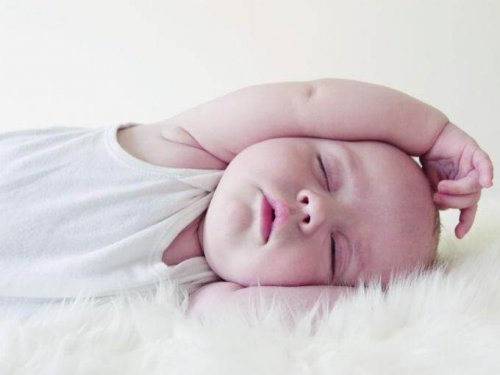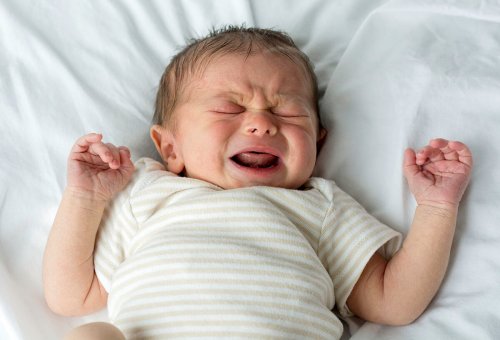Why Do Babies Cry in Their Sleep?

Many mothers ask themselves why their babies cry in their sleep. Our little ones’ rest is often a cause for worry because it affects their mood as well as their behavior.
And every mother knows that the amount of sleep our children get has a major impact on our own well-being as well.
The first thing you need to keep in mind is that crying and whimpering are the ways in which our babies communicate. Therefore, they tend to cry as a way to let us know that something is wrong or that they need our attention.
Perhaps you’ve woken up in the middle of the night to the cries of your child, thinking he or she needed you. But to your surprise, that wasn’t the case. Rather, you found your child fast asleep, eyes closed.
This situation is much more common than you might think. Just the same, many mothers aren’t sure how to react.
Why do babies cry in their sleep?
During the first years of babies’ lives, it’s normal for them to wake up frequently during the night. Babies have a different sleep cycle than adults.
On repeated occasions, babies have a hard time falling into a deep sleep even when they’re exhausted. As a result, they may cry in their sleep. Some may try to fall back asleep, but cannot because they don’t know how. Why? Because they need you.
Nightmares are another reason why babies cry in their sleep. Just like adults, babies have dreams. Most of their dreams have to do with their personal experiences.
Sleep disorders in babies

Babies go through several sleep phases that are part of their developmental process. Waking up during the night is part of the process.
Sometimes these episodes are minor. For example, babies may simply let out a small whimper or groan.
However, some episodes can be more persistent and distressing. These episodes are considered night terrors, and have a stronger effect on children.
In either case, the situation is the same… When the mother goes to check on her baby, she finds that, though crying, he or she is asleep. This sleep disorder occurs while babies are in slow-wave sleep – also called non-REM.
During the non-REM phase of sleep, babies experience the deepest level of sleep. Therefore, they aren’t able to wake themselves completely. Nor are they completely aware of what’s happening to them.
When babies cry in their sleep, they may feel agitated, confused and frightened. At the same time, they’re unable to react to external stimuli.
Night terrors last for short periods of time. They’re over in a few minutes, at which point children go back to sleeping peacefully.
At the same time, some children wake up in a confused state and may even sit up and open their eyes. This phenomenon – called confusional arousal – can last between 5 and 15 minutes. If you attempt to calm a child in this state, it will only make the situation worse and last longer.
How to calm a baby that is still sleeping?
If your baby cries with his or her eyes closed, the best thing you can do is be patient, wait, and observe.
The fact that children cry or make some noise while sleeping doesn’t always mean they want to wake up. As long as their eyes are closed, this is a sign that they’re still sleeping.
When babies cry in their sleep, it’s extremely important that parents pay attention to the sound they make. This helps determine what babies need. They may be cold or hungry, or have some other unsatisfied need.
If so, they won’t be able to fall back asleep quickly. It’s important we tend to our crying babies to help them feel better.
“When babies cry in their sleep, they may feel agitated, confused and frightened. At the same time, they’re unable to react to external stimuli.”
When these episodes occur in the wee hours of the morning, parents should stay calm and silent. This is to avoid waking their sleeping children.
Tend to their needs with just a minimal amount of light – avoid using any bright lights. Doing so may wake babies completely and lead them to think it’s time to get up.
Finally, keep in mind that it’s absolutely normal for babies to make noise while they’re sleeping. At the same time, if babies cry or whine, parents should check on them to see if they’re sleeping or awake.
Advice for mothers

The most important piece of advice we want to give you is to avoid trying to wake your child during these episodes. Rather, be as quiet as possible, close to your child, and wait for him or her to calm down.
In conclusion, these episodes may occur spontaneously, but they can also be the result of external stimuli.
For example, they may occur due to some persistent noise or a change in the position of your child’s bed. Therefore, it’s best to avoid any sort of alteration during resting hours.
All cited sources were thoroughly reviewed by our team to ensure their quality, reliability, currency, and validity. The bibliography of this article was considered reliable and of academic or scientific accuracy.
- Bilbao, Á. (2017). Todos a la cama: Cómo ayudar a tu bebé a dormir con amor y confianza. Plataforma.
- Jové, R. (2006). Dormir sin lágrimas: dejarle llorar no es la solución. La esfera de los libros.
- Kimelman, M., & González, L. (2013). Psicopatología del bebé. Psiquiatría del Niño y del Adolescente, 2, 337-432. http://www.psiquiatriasur.med.uchile.cl/documentos/PSICOPATOLOGIA%20DEL%20BEBE.pdf
- INNOVACIÓN, E. Guía de Práctica Clínica sobre Trastornos del Sueño en la Infancia y Adolescencia en Atención Primaria. https://www.aepap.org/sites/default/files/documento/archivos-adjuntos/gpc_489_insomnio_infadol_lain_entr_compl.pdf
- López, S. A. Trastornos del sueño en la infancia. Trastornos del sueño en el niño: identificación y herramientas para su manejo. https://www.spapex.es/sites/default/files/trastornos_suenyo.pdf
- Rápida, G. (2011). Guía de práctica clínica sobre trastornos del sueño en la infancia y adolescencia en atención primaria. https://portal.guiasalud.es/wp-content/uploads/2018/12/GPC_489_Trastorno_sue%D0%B4o_infadol_Lain_Entr_rapida.pdf
- Ugarte Libano, R. (2011). El sueño en el primer año de vida: ¿Cómo lo enfocamos?: Presentación. Pediatría Atención Primaria, 13, 91-93. http://scielo.isciii.es/pdf/pap/v13s20/seminario01.pdf
- Zamora, T., Pin, G., & Dueñas, L. (2014). El Papel de la matrona en la higiene del sueño del futuro bebé. Introducción al sueño y claves principales en la prevención de riesgos durante el sueño del bebé. Matronas Profesion, 2014, vol. 15, num. 1, p. 28-31. https://core.ac.uk/download/pdf/71047784.pdf
This text is provided for informational purposes only and does not replace consultation with a professional. If in doubt, consult your specialist.








